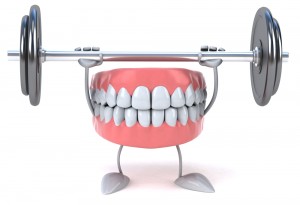 You’ve probably heard of tooth enamel before, but do you know what it is? As your teeth’s first and foremost defense against infection and decay, understanding enamel can help you better protect it from damage and the bacterial processes that erode it, thereby protecting your tooth from decay and possible annihilation. Although enamel is amazingly strong and resilient (it is the hardest substance that your body produces), it is still vulnerable. Astoria dentist, Dr. Leibowitz, takes a close look at enamel to uncover its impressive construction and its vital weakness that you can help protect.
You’ve probably heard of tooth enamel before, but do you know what it is? As your teeth’s first and foremost defense against infection and decay, understanding enamel can help you better protect it from damage and the bacterial processes that erode it, thereby protecting your tooth from decay and possible annihilation. Although enamel is amazingly strong and resilient (it is the hardest substance that your body produces), it is still vulnerable. Astoria dentist, Dr. Leibowitz, takes a close look at enamel to uncover its impressive construction and its vital weakness that you can help protect.
The Strongest Substance Your Body Produces
Tooth enamel is not only the strongest substance that your body produces; it is also one of the strongest known substances on earth, second only to diamonds. The secret to enamel’s strength lies in its structure, which is comprised almost entirely of minerals, such as calcium and phosphate. This mineral composition contributes to the confusion that teeth are the same substance as bone, which also contains these minerals. However, the proteins that help shape your enamel, known as amelogenins, sculpt these minerals differently than those of your bones, forming strands that are thousands of times longer and stronger.
Tooth Enamel’s Weakness
Another crucial difference between your tooth enamel and your bone structure is the presence of living cells. When a bone breaks, cells immediately begin the process of healing. If your tooth enamel cracks or is dissolved, it does not contain the living cells necessary to prompt regeneration. When acid produced by oral bacteria attack your enamel, it can gain strength by absorbing more of its base minerals (remineralization) to avoid tooth decay. Unfortunately, acid attacks also sap your teeth of these minerals (demineralization), depriving enamel the means of refortification. When the acid dissipates and your teeth’s mineral supply is replenished, enamel can recover, but if demineralization out paces remineralization, your enamel will eventually become weak enough to allow bacteria to infect your tooth’s main tissue.
Astoria Dentist Helps You Keep Your Teeth Healthy and Strong
The germs that produce enamel-eroding acid can be found in the formation of dental plaque, which sticks to your teeth from time to time. Brushing and flossing helps control plaque formation and your mouth’s bacterial population, reducing your risk of enamel loss and the development of tooth decay. To learn more about protecting the elements of your dental health, schedule a dental consultation with Dr. Leibowitz. You can contact our Astoria dentist office by calling (718) 728-8320. Located in the 11106 area, we proudly serve patients from Astoria, Queens, Manhattan, Brooklyn, and the surrounding communities.


